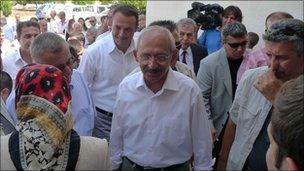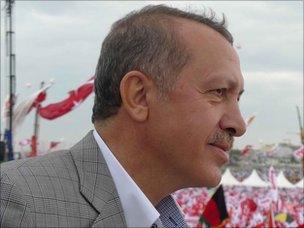Why Turkey's constitutional referendum matters
- Published

The referendum will measure Erdogan's popularity ahead of next year's election
It is difficult to find an issue on which most people agree in Turkey's divisive political culture but the need to change or replace the authoritarian 1982 constitution, drafted right after a military coup, is probably one.
So why is Prime Minister Recep Tayyip Erdogan facing so much opposition to his package of reforms, many of which have been applauded by the European Union?
Trust, or the lack of it, is one reason.
Large numbers of Turks, especially those who enjoy a Western, secular lifestyle, are still uneasy about being governed by the deeply religious Mr Erdogan.
After eight years in office, there is little evidence of a radical Islamic agenda by his Justice and Development Party (AKP) but his abrasive leadership style and intolerance of criticism have lost him the support of many floating voters.
"It is a very loud, aggressive, pushy style, it's a combative style", says Yavuz Baydar, a columnist with the pro-AKPToday's Zaman newspaper, external.
"This puts people off. That means that he has constantly but slowly been losing popularity. Even after eight years of experience of the AKP single majority, we are facing a profound mistrust from certain segments of the republic".
Eyes on the judiciary
Mr Erdogan's plans to enlarge membership of two top judicial bodies - the Constitutional Court and the Higher Council that appoints judges and prosecutors - have aroused particular concern because the judiciary is seen by secular Turks as the most important bulwark against creeping "Islamisation", now that the military has retreated from politics.

CHP leader Kemal Kilicdaroglu says the referendum is just trying to promote Erdogan's AKP agenda
The real effect of this expansion is still being debated but opponents fear it will give the government too much influence.
"These are just regulations brought in by the AKP to advance their own ideology," argues Kemal Kilicdaroglu, the new leader of the opposition Republican People's Party (CHP).
"They want to seize control of the judiciary and end the separation of powers that Turkey learned from Western countries."
Mr Kilicdaroglu, a former civil servant and member of Turkey's Shia Muslim Alevi minority, has turned this referendum into a test of the prime minister's popularity, in anticipation of a general election which must be held by the middle of next year.
He is being credited with reviving the fortunes of the CHP, which has for years been ineffective in opposition.
Few people even understand the reforms they will be voting on in the referendum. Some, like the creation of an ombudsman to mediate disputes between citizens and the state, are straightforward enough, and broadly welcomed. But others relating to citizens' rights merely amend the text in the existing constitution.
Protest vote
Most of the reforms seem very modest - hardly the great democratic leap forward the government claims they will be. For example, the ending of immunity from prosecution for the leaders of the 1980 coup becomes meaningless because on the day of the referendum the 30-year statute of limitations for possible charges expires.

Mr Erdogan is hoping for a convincing win
The way the reform package was rushed through earlier this year has also put people off.
The AKP has talked about amending or replacing the constitution for years. But it has done little, aside from authorising legal scholars to draft a new charter three years ago and attempting unsuccessfully to end the constitutional ban on wearing headscarves in universities.
This reform package appeared suddenly after a dispute in February between rival prosecutors, seen as pro- and anti-government.
The Higher Council of Judges and Prosecutors intervened, stripping the pro-government prosecutor of his authority. The government reacted furiously to what it called a politicised judiciary - the reforms were presented just days afterwards.
"You don't do the constitution in this way," says writer and journalist Ece Temelkuran.
"Nobody knows what's in it, and they gave us so little time to think about it. This government put all these amendments together in a package and they threw it to the ground and told us, if you say yes, you're going to say yes to all of them. This is not correct."
After initially planning to abstain from voting in the referendum, she has decided to vote No, as a show of protest against the way the reform is being handled.
If enough people follow her example, Mr Erdogan risks either losing, or winning by a margin narrow enough to damage his political standing.
- Published9 September 2010
- Published9 September 2010
- Published12 September 2010